Adrian Collins's Blog, page 177
April 27, 2021
REVIEW: The Boys Season 2
The Boys Season 2 continues the Season 1 story of Billy Butcher and his crew taking on the mighty ‘Supes’ in The Seven and attempting to knock them from their perch. More violence. More profanity. More laughter. Those who enjoyed the first season will find that the dial has been turned up on all their favourite things from the show based on the comic book series by Garth Ennis and Darick Robertson. But is it as good as that memorable first season?
Now the origin tale of The Boys getting together is out of the way, The Boys Season 2 allows the series to take more risks and explore the characters that viewers are now familiar with whilst introducing a few more interesting ones to be loved and hated. There are a lot of storylines and development across the eight episodes as Karl Urban’s Billy Butcher deals with the revelation that his wife, Becca, is alive and living in fear. Her death was the fuel that drove him forward on his vengeful mission against the superheroes abusing their power and enjoying the adoration of the public. Karl Urban once again shines in his role as a man hardened by grief but The Boys Season 2 allows for moments where the cracks begin to show in his tough exterior. His older brother/younger brother dynamic with Hughie is great to watch and the time spent with Butcher’s family allows an insight into his past that helps explain what shaped him and made him into the man we see today. Scenes with fellow Lord of the Rings cast member John Noble were especially poignant and a highlight of the series.
Stories laced with grimdark often succeed when they have well-developed villains that the audience love to hate and The Boys Season 2 not only has the despicable, arrogant, over-powered character of Homelander; it also introduced Stormfront – a new female member of The Seven with enough cunning and trickery that she is seemingly able to stay one step ahead of Homelander and even offer him advice on improving his image. In a theme that runs through The Boys Season 2, we see the cracks in Homelander’s image. The series shows that there are strengths and weaknesses in all the characters on display – a human side to the superheroes and threads of the nature versus nurture debate run through the show. It would have been interesting to have a few more episodes for the show to explore these themes and look at what it means stand up against hatred in this century but instead we get a super-powered Nazi blasting Emperor Palpatine-like electricity so I can’t complain.
The Boys Season 2 offers a look at many of the lives of the expanding cast of characters and though interesting, some of the plotlines push aside others so that this season doesn’t feel as tight as the first. The Deep has some wonderful comedic moments as he attempts to find a way back into The Seven and Frenchie’s bond with Kimiko is further developed and given extra context. Unfortunately these threads push Hughie and Starlight, two of the main characters from the first season, to the side. They feel like the least interesting characters in The Boys Season 2 which instead focuses on the brilliant Billy Butcher and Homelander, but hopefully they will have more to do in the next season.
All the gore, violence and laughter from the first season – The Boys Season 2 continues to be great TV that stands out from other superhero shows. It has some incredibly dark moments that most shows shy away from and though it is not as tight as the first season, The Boys Season 2 is an enjoyable feast of filth with excellent actors and some cracking fight scenes. And following that reveal at the end, bring on the next season!
The post REVIEW: The Boys Season 2 appeared first on Grimdark Magazine.
April 26, 2021
REVIEW: She Dreams in Blood by Michael R. Fletcher
She Dreams in Blood is the sequel to the excellent Black Stone Heart, book one of the Obsidian Path. The first novel is a finalist in the 2021 Self-Published Fantasy Blog Off (SPFBO), and with good reason as it’s an excellent book.
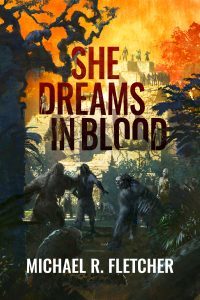 The sequel continues the first-person narrative of Khraen, once and (future?) Demonist Emperor. He has a few more shards of his obsidian heart and the memories that come with each piece, but still searches for the remaining pieces. He’s becoming more powerful with each shard, but also increasingly frustrated as his memories are just shy of completion.
The sequel continues the first-person narrative of Khraen, once and (future?) Demonist Emperor. He has a few more shards of his obsidian heart and the memories that come with each piece, but still searches for the remaining pieces. He’s becoming more powerful with each shard, but also increasingly frustrated as his memories are just shy of completion.
“If my soul-devouring empire was all that stood between humanity and utter destruction, I wasn’t the villain. Maybe I wasn’t the hero, but stories of dashing heroes doing noble deeds are horseshit.”
At the heart of Kraen’s partially restored memories are two women. The first is his necromancer soul-mate who travels with him, harvesting the bodies of dead women to keep her “fresh” and appealing to Khraen. He battles with he moral issues of her taking the lives of innocent women to sustain herself versus his near obsessive need to have Henska at his side. He rationalizes that she’s no more than a predator who needs to kill to survive, much as an animal might do.
“These were the terrible decisions a truly good man could never make.”
The second woman isn’t a mortal (or undead) woman at all but an ancient goddess. Khraen is slowly become aware of this being, known only to him through his reawakening memories as She Dreams in Blood. Khraen is slowly starting to realize that there are forces beyond his own awareness that are responsible for how his destiny has turned out.
“Was a flawed soul better than none at all?”
She Dreams in Blood is a fascinating study in the internal struggle between right and wrong, as Khraen tries to balance his desire to do good things in the world with his need for reclaiming his lost power, along with enacting vengeance on those who’d betrayed him. The more he learns about his past, the more Khraen starts to realize that his still missing memories of Henska are crucial. How much has she manipulated the path of his life to get to this point, and how influential is she over the future? He knows that she loves him and she does everything she does for him, but at what cost?
“There was something terrifying about someone willing to do anything they thought was in your best interest.”
We’re not there yet, but we’re getting closer to discovering the missing pieces in Khraen’s memory, and how he will reconcile those with what he wants to do going forward. Will he find a balance between the villain that the world portrays him and the moral man he feels he should be? Or is he doomed to repeat his mistakes of his previous centuries as emperor?
Read She Dreams in Blood by Michael R. Fletcher
The post REVIEW: She Dreams in Blood by Michael R. Fletcher appeared first on Grimdark Magazine.
April 25, 2021
REVIEW: The Helm of Midnight by Marina J. Lostetter
While I can appreciate the writing skill and the fascinating premise in, The Helm of Midnight, the first book in The Five Penalties series, it was a slower read for me which took me out of the action more than I would have liked.
“His will to kill might very well be ingrained in his echo.”
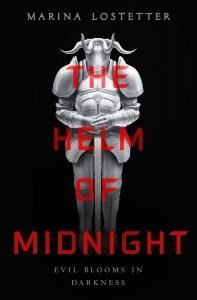 The first thing you notice when you hold The Helm in Midnight in your hands is the gorgeous cover art and tagline, “Evil Blooms in the Darkness.” The cover art combined with the saying gets you thinking about all sorts of intriguing ideas. To go along with the tag line, the author, Marina Lostetter described the story as The Silence of the labs meets Mistborn. Two of my favorite novels. The premise of the novel is certainly not far from that mashup. There is a lot of evil in this story combined with solid fantasy elements.
The first thing you notice when you hold The Helm in Midnight in your hands is the gorgeous cover art and tagline, “Evil Blooms in the Darkness.” The cover art combined with the saying gets you thinking about all sorts of intriguing ideas. To go along with the tag line, the author, Marina Lostetter described the story as The Silence of the labs meets Mistborn. Two of my favorite novels. The premise of the novel is certainly not far from that mashup. There is a lot of evil in this story combined with solid fantasy elements.
The story starts with a very detailed heist, a heist that goes somewhat off of the rails. Or did it? This fantasy story has the flavor of a police procedural. We are introduced to three protagonists in three different time frames. At first, this felt jarring, but Lostetter is an excellent storyteller and gave each of the protagonists’ solid voices that made them easy to differentiate them from one another. Firstly, we have Krona, whose story takes place in the now. I found her to be the most interesting of the three people. She has a complex relationship with her sister De-Lia.
Krona’s profession is that of a Regulator who protects magical artifacts; this includes the magical death mask mentioned in the blurb. There is a lot to unpack for Krona’s character, but mostly what I think of her are tenacity and intelligence. Essential aspects for someone who is in an investigative field. She is well written, and I enjoyed her sections of the story immensely.
Secondly, we have the character Melanie, and her chapters take place two years before Krona’s chapters. I did not connect with Melanie as much as I would have liked. Much of her story I can’t go into as it can be a bit spoilery, but she is an essential aspect of the overall narrative. Finally, the third point of view is that of Chabon himself. This is where Lostetter’s skill at writing shines. He is freaking terrifying, evil personified. But, his character’s darkness was familiar in that it resembled the malevolence of serial killers in history. I liked that. It allowed me to make some connections but also added a terrifying believability.
The darkness and violence in this story are executed very well. Wow. I enjoy dark fantasy and complex characters, so this was right up my alley on that front. There must have been a lot of research into the darkness and violence.
The only reason this wasn’t a five-star read for me was it slowed down a bit and lost connection between the chapters. I will be reading the second book of this series, as the premise and world-building were well done. I liked just about everything, and I am hoping that the next book will be a smidge smoother between transitions. That might be due to me as a reader and what I am looking for in stories. Lostetter is a fantastic writer, though, and if you are looking for a story that hits horror notes and fantasy, this is it!
Read The Helm of Midnight by Marina J. Lostetter
The post REVIEW: The Helm of Midnight by Marina J. Lostetter appeared first on Grimdark Magazine.
REVIEW: The Hand of the Sun King by J.T. Greathouse
I received an uncorrected proof copy of The Hand of the Sun King in exchange for an honest review. Thanks to J.T. Greathouse and Gollancz for the opportunity.
 The Hand of the Sun King is the first-person perspective autobiography of Wen Alder as he informs the reader of his younger, formative years, and his thirst for magic with no limitations. On one side of his family, Alder is a descendent of the great General Wen Broad-Oak, and after a dip in the family’s fortunes, Alder’s father wishes for him to redeem their name to its previous place of prestige. From his mother’s side, the blood of the old magic runs in his veins, and his grandmother and notorious uncle Harrow Fox route for the resistance against the Emperor and Sienese rule. Alder has two possible paths, a choice of two cultures, a decision of where his loyalties lie, the possibility of two different types of magic, our protagonist even has two names. Wen Alder and Foolish Cur.
The Hand of the Sun King is the first-person perspective autobiography of Wen Alder as he informs the reader of his younger, formative years, and his thirst for magic with no limitations. On one side of his family, Alder is a descendent of the great General Wen Broad-Oak, and after a dip in the family’s fortunes, Alder’s father wishes for him to redeem their name to its previous place of prestige. From his mother’s side, the blood of the old magic runs in his veins, and his grandmother and notorious uncle Harrow Fox route for the resistance against the Emperor and Sienese rule. Alder has two possible paths, a choice of two cultures, a decision of where his loyalties lie, the possibility of two different types of magic, our protagonist even has two names. Wen Alder and Foolish Cur.
The Hand of the Sun King is set in an expressive and picturesque fantasy world with Eastern influences. It contains an intriguing yet not too complex magic system that embraces the pattern of the world where the user manipulates the world like a calligrapher would their art. The magic system and the world-building are cleverly presented to the reader as Alder sees or learns things during studies or his postings throughout the Empire. There are deep histories, detailed cultures, teachings of famous philosophers, and some wonderful children’s stories, such as an extremely memorable and important moment about a Cat who wanted to be a Student. The Hand of the Sun King is full of political maneuvering, characters with unclear motives, betrayals, hardships, and tragic moments that will impress fans of Robin Hobb’s Fitz and the Fool novels.
It wasn’t always pleasant to follow Alder’s adventure because a lot of horrible things seem to happen to him and those he cares about and because, in his search for a possibility of magic without limitations, he isn’t always likeable. The Hand of the Sun King is an arresting read that is full of drama and some fine characters to help or hinder Alder on his journey to find his place in the world. Greathouse is an excellent writer and when reading one of the many impactful, emotional, and engaging passages I often nodded to myself knowing that the author got the most out of that moment in an admirable, satisfying manner.
The pace throughout is pretty steady, almost soothing sometimes which juxtaposes the harrowing happenings. The Hand of the Sun King takes place in about 4 very distinct settings which are the backdrop to 7-8 very impressive, standout moments. With about 40 pages left of this 400-page book, I built myself up for disappointment. I didn’t know how the author could possibly wrap up the novel in a gripping, exciting way that allowed it to work as a standalone instead of just a first-in-a-series groundwork book way. It was as if that author has envisaged my doubts as what followed was one of the best finales of a debut novel I can remember reading in a very long time.
Greathouse should be proud of what he has accomplished here. The Hand of the Sun King is an excellent mix of classic and modern fantasy with a grimdark undertone of despair. The author wears some of his influences on his sleeve which works well mostly but there was one, I assume, The Name of the Wind-inspired moment that made me groan. That aside, I had an extremely positive time reading The Hand of the Sun King and heartily recommend it to readers who have enjoyed debuts from recent years such as The Poppy War, Blackwing, and We Are the Dead. Depending on what comes next, the Pact and Pattern series could become a future classic with the pieces on the Stones board now set and the potential and possibilities endless. One final note is that the title and the cover, to me, seemed to be added new meanings by the time I’d finished the book, but perhaps I’m just peculiar. Either way, a solid 9/10 rating.
Read The Hand of the Sun King by J.T. Greathouse
The post REVIEW: The Hand of the Sun King by J.T. Greathouse appeared first on Grimdark Magazine.
April 24, 2021
REVIEW: The Warmaster by Dan Abnett
It’s been a good while since I’ve picked up a Gaunt’s Ghosts novel, a series of books I’ve long described as Band of Brothers meets Warhammer 40,000 and one of the best jump-in series for new 40k fans. The Warmaster is book #14 in this utterly brilliant series of military sci-fi / fantasy and even this far into the series I found exactly what I was hoping for when I opened the cover and got stuck in: whirlwind action, heart wrenching deaths, points-of-view from men only second to the Emperor all the way down to the lowest grunt, and an understanding of the scale of wars 40k is famed for as only somebody as brilliant as Dan Abnett can deliver.
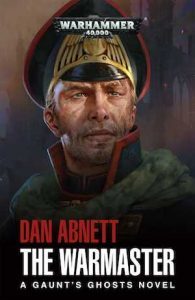 Outside of the barnstorming action and the connection to a huge cast of characters that you’ve come to expect from Abnett over the last 13 books of this series, The Warmaster pushes forward the story of the Sabbat World crusades, with Gaunt’s Ghosts being spat from the warp after their desperate fight on Salvation’s Reach 10 years later. A warp anomaly has left them sitting ducks for the Sons of Sek and a monstrous, mysterious chaos cruiser, and as always, the Ghosts find their backs to the wall in this first fight and for the rest of the book as they make their way to the manufactory world of Urdesh.
Outside of the barnstorming action and the connection to a huge cast of characters that you’ve come to expect from Abnett over the last 13 books of this series, The Warmaster pushes forward the story of the Sabbat World crusades, with Gaunt’s Ghosts being spat from the warp after their desperate fight on Salvation’s Reach 10 years later. A warp anomaly has left them sitting ducks for the Sons of Sek and a monstrous, mysterious chaos cruiser, and as always, the Ghosts find their backs to the wall in this first fight and for the rest of the book as they make their way to the manufactory world of Urdesh.
The Warmaster delivers so much in one book, but I need to be absolutely clear on one thing, it does not provide a conclusion to the Urdesh war or the story of the Ghosts. I’ll need to review Anarch for that to happen, but I can assure you it’s ordered and already in the post.
The Warmaster ramps up the political intrigue–the infighting between the lords of the Astra Militarum–while also really showcasing the cost of the war on all men and women great and small. From soldiers at their wits and courages’ ends, to commanders of the entire segmentum turning recluse at the worst possible time, this book really focusses on the human cost of such great endeavours. I really enjoyed this aspect to the book, and how each of the books in this series that comes out just gets heavier in this way. Again, I’m not sure if Band of Brothers was an inspiration for Abnett, but he just absolutely nails the human cost in much the same way that series did.
Ibram Gaunt, Mkoll, Tona and Dalin Criid, Felyx, Ban Daur, Brostin, Merryn, and so many characters we’ve grown to know and love (or despise, but secretly love when they show up on page) are all there. The gaps in the ranks are there too–thirteen books of friendships, villains wearing the Tanith First and Only colours, innocents, and more, lost in the pages of military misfortune, violence, and sadness. These are the true stars of Abnett’s works. Not the tanks, or the squalls of lasfire, or the void ships, the trench warfare–it’s the people that make this story. And Abnett’s ability to make you care about so many of them is what makes him Black Library’s tip of the spear author, and Gaunt’s Ghosts, in my opinion, his magnum opus for Warhammer 40,000.
Despite my pretty obvious adoration for this series, I did feel somewhat frustrated by the ending. as I purchased a paperback I knew, perhaps one third into the book, that Abnett’s scope for this book was far too large for the page count. It kept expanding, and expanding, and riling up my excitement at the sheer scale of what he’d put to paper. True to form, the ending of this book was a clear, but not tremendously impactful, cliffhanger to lead into Anarch.
Now, had I of read The Warmaster in 2017 when it was released and then had to wait two whole years, I would have been fairly unhappy. As I’m reading it now two years after the release of Anarch it’s not so much of a problem. I actually can’t wait for Anarch to arrive in the post so I may see just how Abnett wraps up everything he built as a foundation in The Warmaster.
All in all, an excellent book of the same level size, scope, pace, veracity, and emotional engagement that I’ve come to expect from Abnett over the decade and a half I’ve been reading this series. The Warmaster is yet another top shelf military sci-fi that pulls at the heart strings in a way few authors ever manage.
Read The Warmaster by Dan Abnett
The post REVIEW: The Warmaster by Dan Abnett appeared first on Grimdark Magazine.
April 23, 2021
An Interview with Peter McLean
Greetings grimlings! This issue I join you from a dingy bar in Ellinburg where I have finally cornered Peter McLean for a chin wag. In case you are unfamiliar, Peter is the author of the fantastic series The War for the Rose Throne which started with Priest of Bones. If you haven’t read this series (which still has two more installments coming), I highly recommend rectifying that situation posthaste!
Peter, thanks for taking time out of your busy schedule and welcome!
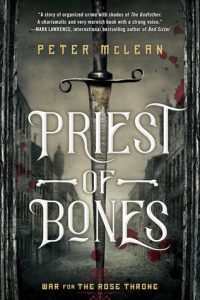 [PM] I’ll allow that you’ve found me. Pull up a stool, pour yourself a brandy, and let’s talk business.
[PM] I’ll allow that you’ve found me. Pull up a stool, pour yourself a brandy, and let’s talk business.
[GdM] Let’s start off with your leading man—Tomas Piety. He is an interesting contradiction of a man. A priest from the army who basically came from being a small-town mob boss and then returned back to it after playing preacher in the war. What inspired such a complex character for you?
[PM] Ah, Tomas is a reflection of the archetypical gangster transposed into a fantasy world. He’s the abused working-class kid who worked his way up from petty crime in the slums to organised crime in the big city, and built a criminal empire with his younger brother. The whole priest thing was a strange development. I had the title “Priest of Bones” written on a post-it note on my desk long before I had the faintest idea what it meant. It was just one of those shower thoughts, you know? I thought, “That would be cool”, but at the time I had no coherent idea what “that” actually was. Once I had put together the Elizabethan-but-sort-of-post-WWI vibe I wanted, the idea of Our Lady of Eternal Sorrows just came to me. She is the death goddess that the conscript soldiers worship in a desperate attempt to persuade Her not to take their life today. When their company’s priest falls in battle Tomas, being the only other soldier with any leadership experience, is chosen as his natural successor. He’s not a religious man in the slightest, but he has an innate ability to make people want to confide in him, to say their confessions.
And of course, the war had a huge effect on him as it did everyone else who fought. I was really going for the Great War experience with his memories of Abingon, the horrors he lived through that he will never forget. So much fantasy focusses on epic wars, but there is often little acknowledgement of the legacy that war leaves in its wake. That is something I’ve been trying to redress throughout this series.
[GdM] Now onto Tomas’ second—Bloody Anne. I have to say that as far as supporting casts go, she is one of my favorites. Loyal as hell to Tomas and a hard-nosed, badass in her own right. We all see constant criticisms online when men write strong female characters. Was it hard as a man writing Bloody Anne? Also, was she inspired by anyone you know?
[PM] Oh gods I absolutely adore Bloody Anne. I basically wrote her as the best mate I wish I had, in the same way I have always wanted Druss the Legend to be my dad (no, I’m not all that much younger than Druss now, shut up). Was it hard to write her as a woman? No, I don’t think so. I have met a fair number of women in my 48 years of life, and am actually married to a real live one. Women aren’t a different species, and I’ve never really understood the perceived problem with this. Anne is, I hope, a living breathing person in War for the Rose Throne like anyone else is.
[GdM] We’ve seen Tomas evolve as the series moves on and he matures. Without spoiling too much, recent installments of this series have shown his role even as a crime boss drastically change due to what I—in the interest of remaining spoiler free for the readers will call—outside pressure. Will we be seeing Mr. Piety expand his operation into a bigger arena in future stories?
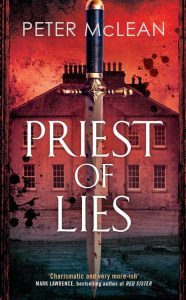 [PM] Oh, and then some. The archetypical gangster’s story arc can only go in a few directions. He dies, he turns snitch, or he goes into politics. Again, trying to avoid spoilers, but bear in mind we have the fantasy equivalent of the CIA/MI6/Gestapo involved in this and… yeah. Tomas’ life gets a lot more complicated after Priest of Lies.
[PM] Oh, and then some. The archetypical gangster’s story arc can only go in a few directions. He dies, he turns snitch, or he goes into politics. Again, trying to avoid spoilers, but bear in mind we have the fantasy equivalent of the CIA/MI6/Gestapo involved in this and… yeah. Tomas’ life gets a lot more complicated after Priest of Lies.
[GdM] One thing I really liked about the Rose Throne setting is it focuses more on the gritty underbelly of the world and the magic system doesn’t overpower the story. It is used sparingly and not a tool to drive the plot forward. What was your thought process like when building this world in your head?
[PM] I write the sort of books that R.J. Barker so wonderfully described as “historical fiction but if a wizard had been there”. Some people call that grimdark but as absolutely no one can agree what that actually means I’m a bit over the term, to be honest. But gritty underbelly, definitely. This is a semi-industrial world where the working classes in the cities toil in factories and mills, and many people can’t read or write. The City Guard (police) are corrupt as all hell, and the people actually in charge aren’t who everyone thinks they are. So, nothing like the modern world whatsoever…
I wanted to have magic, because it’s ultimately a fantasy series, but I wanted magic to be an uncommon thing, feared and mistrusted. Even those few cunning folk who can work magic don’t necessarily know how they do it, or fully understand what using their powers is actually doing to them. That’s something you see a lot more of in Priest of Gallows.
[GdM] Let’s shift gears for a moment. Something we’ve bonded over online besides fantasy books—a mutual love of martial arts. For the readers, what is your background in martial arts and how does that influence your writing of fight scenes?
[PM] I haven’t trained for years now but when I was younger I studied a system based on Chinese Wudang kung fu. I got up to black sash level and taught for a few years, but eventually found I didn’t have the time to do everything I wanted to do. Something had to go if I wanted to work and write as well, so I dropped the martial arts in the end. I think the main thing I learned, that has definitely carried over into my writing, is that real fights are brutal and extremely short!
[GdM] And you knew this one was coming. We both love good whisk(e)ys, you preferring scotch. Does it play any role in your creative process, or is it simply a reward for putting in good work?
[PM] You know the expression “creative juices”? Creative juice is a light amber colour and comes in a bottle with “Whisky” written on it.
[GdM] What kinds of things sparked your early love of fantasy? I feel like maybe there was a D&D influence in there somewhere.
[PM] I did used to play occasionally (AD&D 2e, I’m that old), I but was already a fantasy lover before I discovered it. I kinda grew up with it, really. My mother was an English Lit teacher and Tolkien scholar, and my dad was a big SF reader so I’ve always been surrounded by the genre.
Mum first read The Hobbit to me when I was about six or seven years old, and I loved it. I read Lord of the Rings myself when I was a bit older, and then went on to hunt down other things. This being the early 80s there was nothing like as much fantasy about as there is today but I devoured Sword of Shannara and then discovered Michael Moorcock and then David Gemmell, and didn’t look back from there.
[GdM] Which part of the whole writing/publishing process do you find the most challenging? Which part is the most fun?
[PM] Honestly, I find writing the first draft the hardest thing. If revisions are like sculpting your statue, drafting is dragging the block of marble into the studio to start with. Hard work, but necessary. I think the most fun is working on developmental edits, once you have your editor’s feedback. I’ve been fortunate enough to work with some of the best editors in the business, and having an experienced eye on your work is invaluable.
[GdM] When you complete this series, what is next for you? More books in the same setting or are you plotting something entirely new and different?
[PM] I’ve got something completely different in mind. Something much more “fantasy” than War for the Rose Throne. Although I’ll be sad to leave Tomas’ world behind, his story is very much told by the end of the fourth book. Never rule out a spin-off though, I’d love to do one if there was enough interest.
[GdM] And finally, this is your chance to sell the audience on your up-and-coming wares. Tell us what you have coming out and when.
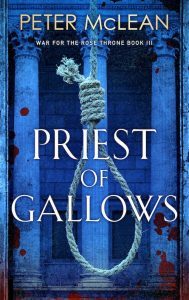 [PM] Well the third book of the War for the Rose Throne quartet is Priest of Gallows, which picks up where Priest of Lies ended. That’s out May 27 this year, and will be followed by the fourth and final book Priest of Crowns in 2022.
[PM] Well the third book of the War for the Rose Throne quartet is Priest of Gallows, which picks up where Priest of Lies ended. That’s out May 27 this year, and will be followed by the fourth and final book Priest of Crowns in 2022.
For anyone who wants to keep up to date with what I’m up to, I’m @PeteMC666 on Twitter, or my website is at Talonwraith.com
[GdM] Peter, again, thank you so much for taking the time. Now, where do they keep the real whisky in this place?
[PM] Thanks for talking to me!
Read The War for the Rose Throne by Peter McLean
This interview was originally published in Grimdark Magazine Issue #26.
The post An Interview with Peter McLean appeared first on Grimdark Magazine.
April 22, 2021
REVIEW: The Boys Season 1
The Boys Season 1 is an eight-episode superhero series from Amazon Prime. Adapted from the dark, funny, and at times repulsive graphic novels by Garth Ennis and Darick Robertson, The Boys S1 manages to provide a fresh take in what is probably the most popular (and successful) genre of this generation.
Fans of the graphic novel were rightly apprehensive when the show was announced. A tale of superheroes caught up in their own hype, feeding into the excesses of their lifestyle and behaving with impunity from the law thanks to their powers – the superheroes in this tale are certainly not Superman or Captain America. The graphic novel is known for its unfiltered take on superheroes exploiting their position in society and behaving in the most awful of ways. After watching The Boys Season 1, it is clear to see that the fans will not be disappointed. The show keeps the filth and depravity that made the graphic novels stand out from other tales – it places a lens on how modern society is so quick to place people on pedestals with barely any understanding of what they are truly like as people. The Boys Season 1 is a superhero satire that perfectly deconstructs the superhero genre whilst tackling serious real world issues.
On top of this, there needs to be a good story. Thankfully, The Boys Season 1 keeps things nice and simple. Following the death of his girlfriend at the hands of a member of The Seven – a warped version of The Justice League – Wee Hughie joins forces with a team of regular folk pissed off with the ‘Supes’ not being taken to account for their actions. Hughie is an easy character to root for. His complete sincerity and genuine grievance against the arrogant superheroes make him easy to root for. Recruited by the sadistic, vengeful Billy Butcher (played by Karl Urban in a perfectly cast role), he joins The Boys – a group intent on showing the world that the superheroes are nothing more than corrupt, egotistical sociopaths. The Boys Season 1, as with all great stories, needed a strong villain for our heroes to go up against, and Homelander knocks it out the park. The leader of The Seven, and Captain America wannabe, smiles for the cameras and says all the right words but behind the scenes, he is shown to be a sick, selfish, and sadistic individual. Every scene with Homelander or Butch is must-see TV with Karl Urban and Antony Starr smashing it in their respective roles.
 The Boys Season 1 holds nothing back in terms of the gore and violence. From Hughie left holding his girlfriend’s hands as the rest of her body is torn away from him, to death by orgasm and a disturbing scene involving a dolphin that must be seen to be believed – The Boys S1 is more than able to hold up against its comic counterpart. It straddles the line between disturbing and oddly hilarious thanks to the strong writing and a cast that goes all in on their characters. The ultraviolence is balanced with strong bonds built between characters who genuinely seem to care for one another. The found family aspect of The Boys, the budding romance between Hughie and innocent The Seven newcomer Starlight, Frenchie caring for The Female – all these threads and moments are earned and manage to ground the story with some heart amidst the gore and violence.
The Boys Season 1 holds nothing back in terms of the gore and violence. From Hughie left holding his girlfriend’s hands as the rest of her body is torn away from him, to death by orgasm and a disturbing scene involving a dolphin that must be seen to be believed – The Boys S1 is more than able to hold up against its comic counterpart. It straddles the line between disturbing and oddly hilarious thanks to the strong writing and a cast that goes all in on their characters. The ultraviolence is balanced with strong bonds built between characters who genuinely seem to care for one another. The found family aspect of The Boys, the budding romance between Hughie and innocent The Seven newcomer Starlight, Frenchie caring for The Female – all these threads and moments are earned and manage to ground the story with some heart amidst the gore and violence.
Bloody, violent, and sickeningly funny – The Boys Season 1 is a superhero show that stands out from the crowded field and delivers a story with heart. If you are even a bit squeamish around sex and violence, this is not the show for you. It is excessive, extreme, and downright insane at times but if you can stomach it, The Boys Season 1 is a some of the best TV you will see this year.
Watch The Boys Season 1
The post REVIEW: The Boys Season 1 appeared first on Grimdark Magazine.
April 21, 2021
REVIEW: The Wrack by John Bierce
John Bierce’s The Wrack is an exciting and unique take on a fantasy novel. You don’t read many fantasy novels that take on the plague as a plot point. Science Fiction, sure. Urban fantasy, occasionally. But not a pure fantasy novel. That is why this novel was such a treat to read for me. When I started reading it for the tour, I almost had to put it down. I have avoided apocalyptic/disease type novels, if you will forgive me, like the plague. They are usually too much with the state of the world. We live in a time with an actual epidemic, and sometimes I don’t need the fantasy I read to reflect on real life.
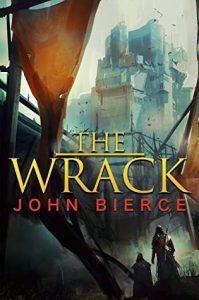 I am glad I kept reading, though, because The Wrack is a fantastic fantasy book that might be one of my favorites thus far this year.
I am glad I kept reading, though, because The Wrack is a fantastic fantasy book that might be one of my favorites thus far this year.
The plot is the spread of a mysterious illness, called The Wrack, a plague that lays waste to the people and kingdoms. It spares few, and leaves screams and wailing in its wake. It is a terrifying concept, to look in the face of the plague, and flail and grasp for answers while it decimates poets and paupers alike. That feeling of abject desperation was almost anxiety-inducing.
It is brilliant writing on the part of John Bierce.
Stylistically The Wrack reminds me of World War Z, written by Max Brooks. World War Z was a collection of vignettes of different societies and cultures, and that dealt with zombies. The Wrack has a similar feel, with Bierce touching on many different areas of the kingdom, rich and poor alike, and showing how they react. Maybe it is because of the short length of the story, or the shortness of individual chapters, but I did not connect much with the characters. It all became awash in the multitudes of suffering people. Even in that, the actual characters are a supporting cast. The real star of the story is the plague, The Wrack.
The world-building was also one of the main stars of the story. As you can tell, this isn’t character building or character-heavy. If The Wrack is the star of the story, I think the main supporting character is the cities and kingdoms that Bierce describes. He created an extraordinarily rich landscape full of very different cultures. All of which play a pivotal role in how groups or individuals react to something like a plague. The magic system is also unique. Seers, magic users, use different polished stones, set in their eye sockets to see and read another plane of energy. When seers look at people about to suffer The Wrack, they get a buildup of wavy lines in their liver. It seems very esoteric to describe, but Bierce did this well. It was a unique magic system, one I would love to read much more about it.
I want to talk a bit about the timing of a book like this. I know with everything going on, it has got to be hard working on a story for years and releasing it only to have the world as a whole take a terrifying dive. I almost had to put it down initially because the feelings I felt, terror, despair, and the overwhelming urge to hide are what these characters are feeling in similar circumstances. It was a hard thing to read. So this book might not be one for all readers, right now. If you can’t take reading something dark with a plague angle to it right now, that is very understandable. But put this book on your TBR for better times, because this is a great story that is well done, even if it had some tiny issues. It is engaging, thought-provoking, and imaginative. I hope that in better times, this book gets all the love it should.
I am looking forward to checking out more of Bierce’s work.
Read The Wrack by John Bierce
Originally published on Beforewegoblog.
The post REVIEW: The Wrack by John Bierce appeared first on Grimdark Magazine.
April 20, 2021
REVIEW: The True Bastards by Jonathan French
The True Bastards from author Jonathan French continues the tale started in his wonderful The Grey Bastards novel that began as a self-published title before strong word of mouth and reviews led to Orbit releasing it and taking on the rest of The Lot Lands series. Fans of The Grey Bastards will be glad to know that though the story’s reins have passed from Jackal to the half-orc Fetch, The True Bastards is still the filthy bastard child of Sons of Anarchy and The Lord of the Rings that we all fell in love with.
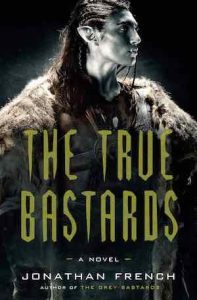 The True Bastards begins almost two years after Fetch reluctantly took over the Bastards. The responsibility of leading the half-orc clan is a heavy burden to bear at the best of times and life in the Lot Lands is getting worse. Still struggling to find her way without her two best friends and forced to lead at a time when food is scarce and a strange illness weakens Fetch, a reminder of the battle at the end of the first book, the clan leader discovers new threats to her home and is tasked with finding a way to survive. Fetch is an interesting character to follow this time around. Headstrong and eager to fight her way out of most situations, we are able to follow her on the path of a leader as she realises that she isn’t just looking after herself now; she has a whole group of people looking to her for their own survival. With the Kiln destroyed following the orc incursion, Fetch must rebuild and figure out the best way forwards, but the Lot Lands is an unforgiving place that doesn’t offer much time for such a transition. The world moves on and waits for no one.
The True Bastards begins almost two years after Fetch reluctantly took over the Bastards. The responsibility of leading the half-orc clan is a heavy burden to bear at the best of times and life in the Lot Lands is getting worse. Still struggling to find her way without her two best friends and forced to lead at a time when food is scarce and a strange illness weakens Fetch, a reminder of the battle at the end of the first book, the clan leader discovers new threats to her home and is tasked with finding a way to survive. Fetch is an interesting character to follow this time around. Headstrong and eager to fight her way out of most situations, we are able to follow her on the path of a leader as she realises that she isn’t just looking after herself now; she has a whole group of people looking to her for their own survival. With the Kiln destroyed following the orc incursion, Fetch must rebuild and figure out the best way forwards, but the Lot Lands is an unforgiving place that doesn’t offer much time for such a transition. The world moves on and waits for no one.
The writing feels tighter in The True Bastards and French slips back into the world with ease. The camaraderie between the characters flows with ease and it is the interactions between Fetch and the people of the Lot Lands where French’s writing truly shines. The playful jokes and banter between The Bastards and others in the world feel genuine and earned, informing the reader that these are characters who have lived and survived alongside one another for some time. In a story full of foul-mouthed half-orcs battling to survive, French effortlessly draws the reader to the bonds between the characters and it gives The True Bastards its beating heart.
Though more of a dark fantasy novel, The True Bastards displays more than enough threads of grimdark in its tapestry. Characters like Fetch, Hoodwink, and others would be right at home in Joe Abercrombie’s The First Law world (aside from the fact that they are half-orcs!). I’d pay good money for a meeting between Hoodwink and Caul Shivers or Fetch and Ferro Maljinn. The scorched terrain of the Lot Lands is grim, filthy and French builds the world with more clarity this time, showing the reader how what it is like to live in a world populated by orcs, halflings, centaurs, elves and men. This is no Middle-Earth – but that is a compliment to the way in which French uses these familiar races and gives us a fresh take.
The True Bastards is a cracking sequel that builds on what was great about the first book and offers a dark and tense story that will make you want to keep on reading. If you enjoyed The Grey Bastards, then you will love The True Bastards. Full of dark humour in a gritty world, pick up a copy in time for The Free Bastards, due out in September 2021. Four Stars.
Read The True Bastards by Jonathan French
The post REVIEW: The True Bastards by Jonathan French appeared first on Grimdark Magazine.
April 19, 2021
REVIEW: Bayou Baby by Renee Miller
New Orleans and its surrounding swamps form the setting for Bayou baby, a highly original and disturbing novel by Canadian author Renee Miller, who mainly writes grim, dark stories that often stray into horror, with the odd bit of black humour sometimes thrown in. Dark, disturbing novels are something I often read from time to time, yet this particular yarn rocked me to my core, mainly due to it being a cocktail of unnerving scenes which include rape, group rape, incest, forced prostitution and eventually also murder and matricide, before turning into a vicious revenge romp. As for Miller’s hallmark black humour, I don’t recall there being much of that in this one.
 The protagonist of this story is Rowan, a half-caste swamp rat who was raised in the quagmire by her half-caste mother Jolene, who makes a living as a prostitute. Rowan’s days of youthful bliss and innocence are cut short when her mother sells her to Rosaline, a New Orleans brothel-keeper, in order to safeguard her future. For in 17th C New Orleans (at least it seems like the period is the 17th C, because Miller does not bog down the narrative with dates and excessive details), half caste women have no chance of making respectable wives, so that being a kept woman is the very best that the prettier faces amongst them can hope for.
The protagonist of this story is Rowan, a half-caste swamp rat who was raised in the quagmire by her half-caste mother Jolene, who makes a living as a prostitute. Rowan’s days of youthful bliss and innocence are cut short when her mother sells her to Rosaline, a New Orleans brothel-keeper, in order to safeguard her future. For in 17th C New Orleans (at least it seems like the period is the 17th C, because Miller does not bog down the narrative with dates and excessive details), half caste women have no chance of making respectable wives, so that being a kept woman is the very best that the prettier faces amongst them can hope for.
Yet Rowan is not one to take this fate lying down (forgive the pun), so that she flees her mother and prospective employer by rowing her little canoe deep into the swamp, until she reaches the refuge offered to her by ‘Mama Gator’, an elderly Louisiana creole who lives deep in the swamp, and who is not averse to practising the odd voodoo ritual against those she thinks deserve it.
Unfortunately for Rowan, two of the victims of Mama Gator’s magic were the wife and child of Lucien Dumas, a highly powerful man of means in New Orleans, whose father was also murdered by Rowan’s mother Jolene (so as to protect her daughter from the perverted old man). Unknown to Rowan, Lucien is intent on exacting his revenge for the loss of his father, wife and child, by taking it all out on her. For unknown to Rowan’s mother Jolene, Lucien has secretly purchased Rowan from the brothel-keeper Rosaline, so that he can exact whatever sick fancy he wants on the young girl. All of which is a disgusting, stomach-turning prospect, yet one rendered all the more twisted when one learns that Rowan is also the illegitimate daughter of Lucien.
Quite why Lucien has waited so long to avenge his family members is anyone’s guess, and it is hard to understand why he would take out all of his ire and hatred on a young, innocent party, even though he has no regard for the lives of half-castes. In turn this means that Rowan proceeds to endure abusive treatment which is abominable to say the least, and which forces her to resort to the most unladylike measures to take down those who sought to break her. If you can survive the outrages and horror in the early part of the novel, the revenge romp which follows might serve as ample payoff.
All in all it’s 4/5 for Bayou Baby, which loses a star due to a couple of loose ends which cannot be dismissed as intentional ambiguity, as well as the overly erratic behaviour of the crocs, who are waved away like bush turkeys in some scenes and lethal in others. Otherwise this no holds barred account also contains moments of genuine warmth and fellowship, as Rowan and her friends desperately seek to fulfil her seemingly impossible mission of revenge against Lucien, who must be the most odious nemesis that I’ve ever encountered in fiction. The horrors endured by an institutionalised half caste subclass are also fleshed out without leaving much to the imagination, and it takes an author of considerable talent to ultimately conjure up some kind of higher meaning to one of the most unsettling stories which I’ve ever read.
Read Bayou Baby by Renee Miller
The post REVIEW: Bayou Baby by Renee Miller appeared first on Grimdark Magazine.



